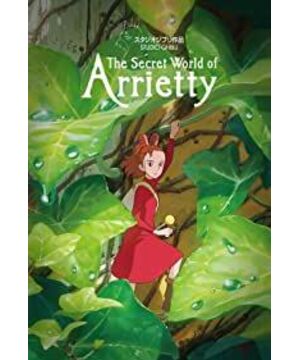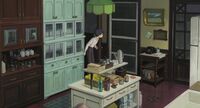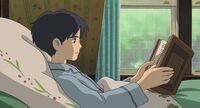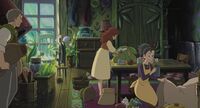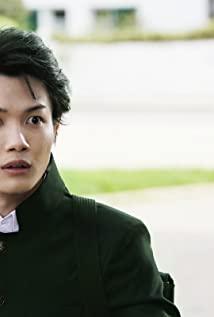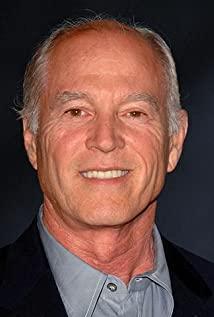I don't know how lonely Miyazaki's childhood was, which is reflected in the image of the male protagonist, the young master. His most abundant activity is lying in the flowers and reading, and he is still reading the novel "Secret Garden" of the same lonely childhood. Only when you are lonely to this extent can you imagine that there is a dwarf elf as his friend, and this work will be produced. The male protagonist of "Princess Mononoke" has been split into the male and female protagonists in this film. The facial features are left to the young master, and the weakness and gentleness are added, and the temperament and demeanor are given to Arrietty. worldview. The lonely young master fits the cutest and most fragile temperament of a girl, and is dubbed by the equally fragile Ryunosuke Kamiki. His temper and words are extremely gentle, even when he is preventing the fat cat from attacking the villain.
The details of Miyazaki's work are very moving. Looking at the world from the perspective of a villain, a drop of water fills a cup of coffee, a small organ for drying clothes, a coccidia in the garden, etc., are full of childhood memories and very careful construction. I thought that this film is like "My Neighbor Totoro", mainly to show details and sell cuteness, but this film still has a lot of fluctuations and twists. There has always been an ambiguous relationship between the male and female protagonists in Miyazaki's works, but they often end up together. The same is true in "The Little Man Arrietty Who Borrowed Things", but the gentle master and the little man Arrietty also crossed races. In the end, because of this, "obviously in love but separated from each other", Arrietty hugged the young master's finger and dropped The scene of tears is even more moving and memorable. I forgot to mention another male protagonist, the indigenous villain who appeared on the scene and said, "A pale young master, a native, a woman, I thought of "Twilight". However, those are three 2 The story of three super loving people. The plot of the aboriginal villain shyly giving Arrietty mulberries made the relationship between the young master and Arrietty less sad.
Similarly, "Arrietty Who Borrowed Things", like the previous works of Hayao Miyazaki, did not break away from the self-discovery in the character's growth and the environmental protection theme of respecting nature. Both the young master and Arrietty have grown up through each other, one has established a passion for life, and the other has learned to face the world maturely. And the way of life of the little people "borrowing things" essentially alludes to the human beings in reality, in fact, they also survive by borrowing things from nature. The villain "borrows" things from humans, and the amount is small and inconspicuous so that humans cannot find it, and there are only a handful of villains. Humans don’t have such a humble attitude to borrow things from nature. In the film, the young master mentioned to Arrietty that there are 6.7 billion human beings, and most of them are rude and stupid, just like the housekeeper in the film. Although this is a subtle mention, but from the beginning to the end of the film, it becomes a dark thread that runs through all of Miyazaki's works.
WeChat public account: feidududu watching movies (feidudumovie)
View more about The Secret World of Arrietty reviews


